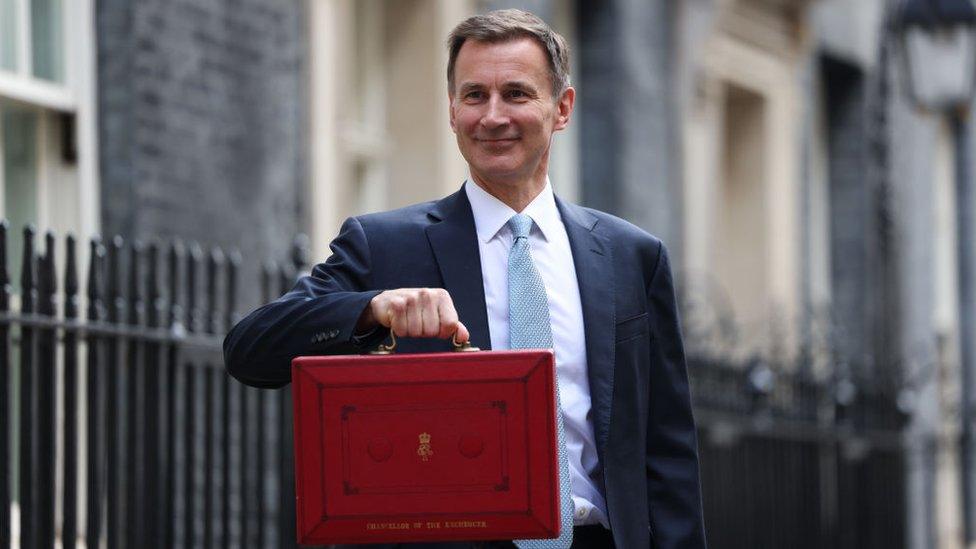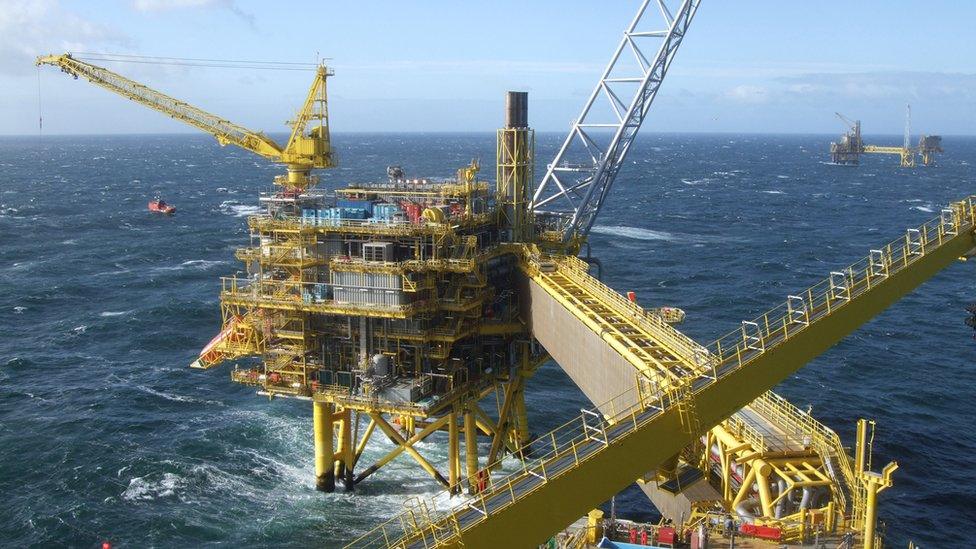Hunt says Scottish oil and gas industry is budget loser
- Published
- comments

Jeremy Hunt made the windfall tax announcement in his Budget on Wednesday
The chancellor has said that the Scottish oil and gas industry is the loser in his budget after he extended the windfall tax on their profits.
Jeremy Hunt announced on Wednesday that the levy on North Sea companies would remain for an additional12 months.
It means the 35% surcharge on profits due to high energy prices will continue until 2029 rather than 2028.
Many Scottish Conservative politicians, including leader Douglas Ross, had opposed the move.
But the chancellor said the industry had to make a "fair contribution" from the additional profits of £1.5bn he said they had made due to the war in Ukraine.
Wednesday's budget saw Mr Hunt announce measures including a 2p cut in national insurance rates and raising the threshold at which people stop receiving child benefit.
When asked on the BBC's Today programme who the losers were from his budget, Mr Hunt said: "Foreigners who are resident in the UK who were able to pay a cheque and avoid paying tax at the same rate as everyone else - the so-called non doms.
"They are going to be paying significantly more tax.
"I've also asked the Scottish oil and gas industry to pay an additional contribution because the war in the Ukraine is lasting longer and oil and gas prices are going to stay higher for longer.
"So I think it's fair that they make an additional contribution to the cost of living."
Mr Hunt had earlier denied "throwing Scottish Tories under the bus" with his decision to extend the windfall tax.

Oil and gas companies will have to pay 35% surcharge on profits due to high energy prices beyond 2028
He told the BBC's Good Morning Scotland programme he accepted the extension "was a difficult decision" for his Scottish colleagues.
The chancellor insisted the UK government continued to support the oil and gas industry which he said had "an absolutely essential role" in providing energy security and dealing with the transition to net zero.
But he said he had to be fair to taxpayers who have been footing the bill for increasing winter heating payments.
Mr Hunt said: "Taxpayers have spent £94bn in cost of living support, helping pay for around half of people's electricity bills over the last winter."
After the Budget announcement, Douglas Ross said he would not support the legislation needed to pass the extension.
He had lobbied the chancellor and prime minister ahead of the budget, warning them that an extension would be the wrong thing to do.
Mr Ross has since urged the chancellor to reconsider the decision, which Mr Hunt said he had no plans to do.
'Generous investment allowances'
The Energy Profits Levy (EPL) was introduced by Rishi Sunak when he was chancellor in May 2022 as a way of funding help for households facing rising bills as energy prices soared following Russia's invasion of Ukraine.
The surcharge on the "extraordinary profits the oil and gas sector is making", external was initially set at 25% and raised an extra £2.6bn in tax revenues, external in its first year.
It was then extended and raised to 35% by Jeremy Hunt last November, taking the overall tax burden faced by UK oil and gas producers to about 75%.
Delivering his budget, Mr Hunt said: "Because the increase in energy prices caused by the Ukraine war is expected to last longer, so too will the sector's windfall profits - so I will extend the sunset on the Energy Profits Levy for an additional year to 2029, raising £1.5bn."
He said "generous investment allowances" would be retained to encourage firms to continue investing.
Mr Hunt told Good Morning Scotland on Thursday that "nothing had been stable since Putin invaded Ukraine".
He added: "If we are going to give £1,500 in cost of living support to typical households - which is what we've done - then I have to pay for it."
Douglas Ross says he will not support the legislation needed to pass the windfall tax extension
Speaking shortly after the announcement, Mr Ross said: "I'm not going to hide my disappointment in the fact I urged the chancellor not to extend the windfall levy but that decision was taken to continue for it for a further year.
"I think that's the wrong choice, I think the chancellor took the wrong decision there. I made it clear to him that I won't support that when a bill that will be required in the House of Commons comes back."
Labour has proposed increasing the windfall tax to 38%, taking the overall tax rate to 78%, while the SNP wants it maintained at the current level.
The Treasury has promised to scrap the scheme if prices fall to normal levels for a sustained period, which would see the tax rate on energy firms fall to 40% .
Industry body Offshore Energies UK (OEUK) has said the extension risked investment, jobs and growth.
Aberdeen & Grampian Chamber of Commerce also criticised the extension, calling it the "fourth Tory tax raid on the North Sea in two years" and predicting the levy would make the sector more uncertain.

Last month, Aberdeen's Press & Journal newspaper printed a controversial front page describing the Labour leadership as 'traitors' for supporting an extended and raised windfall tax on North Sea profits.
This morning the same newspaper accuses the Conservatives of "selling out" the oil and gas industry by extending the tax to 2029.
The SNP have seized on such criticism and will be keen to amplify it ahead of the general election.
After boundary changes, the nationalists lie in second place to the Tories in three newly-drawn North East Scotland constituencies - Aberdeenshire West & Kincardine; Aberdeenshire North & Moray East; and Gordon & Buchan.
In opposing the extension to the windfall tax, the party's Westminster leader Stephen Flynn is keen to link the policy to its potential impact on jobs in Aberdeen, a city he represents in the House of Commons.
But the SNP, in government with the Scottish Greens, also faces difficult questions about its energy policy as it pursues ambitious targets to cut carbon emissions.
A Scottish government consultation on, among other things, whether to adopt a "presumption against new exploration for oil and gas" closed 10 months ago.
We are still waiting for the finalised Energy Strategy and Just Transition Plan which is due to be published by this summer, external.
When it comes, the document will be scrutinised in minute detail here in Aberdeen and beyond, especially if it appears in the middle of an election campaign.